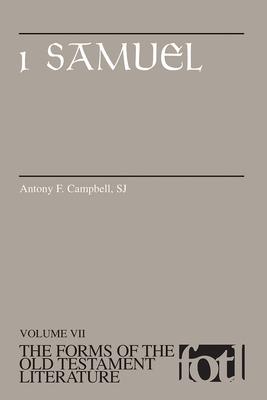Antony Campbell's valuable form-critical analysis of 1 Samuel highlights both the literary development of the text itself and its meanings for its audience. A skilled student of the Hebrew Scriptures and their ancient context, Campbell shows modern readers the process of editing and reworking that shaped 1 Samuel's final form. As Campbell's study reveals, the tensions and contradictions that exist in the present text reflect a massive change in the way of life of ancient Israel. Samuel, the first prophet, here emerges to preside over the rise of Saul, Israel's first king, to be the agent of Saul's rejection, and to anoint David as Israel's next king and the first established head of a royal dynasty. The book of 1 Samuel captures the work of God within this interplay of sociopolitical forces, and Campbell fruitfully explores the text both as a repository of traditions of great significance for Israel and as a paradigm of Israel's use of narrative for theological expression.

Antony Campbell's valuable form-critical analysis of 1 Samuel highlights both the literary development of the text itself and its meanings for its audience. A skilled student of the Hebrew Scriptures and their ancient context, Campbell shows modern readers the process of editing and reworking that shaped 1 Samuel's final form. As Campbell's study reveals, the tensions and contradictions that exist in the present text reflect a massive change in the way of life of ancient Israel. Samuel, the first prophet, here emerges to preside over the rise of Saul, Israel's first king, to be the agent of Saul's rejection, and to anoint David as Israel's next king and the first established head of a royal dynasty. The book of 1 Samuel captures the work of God within this interplay of sociopolitical forces, and Campbell fruitfully explores the text both as a repository of traditions of great significance for Israel and as a paradigm of Israel's use of narrative for theological expression.